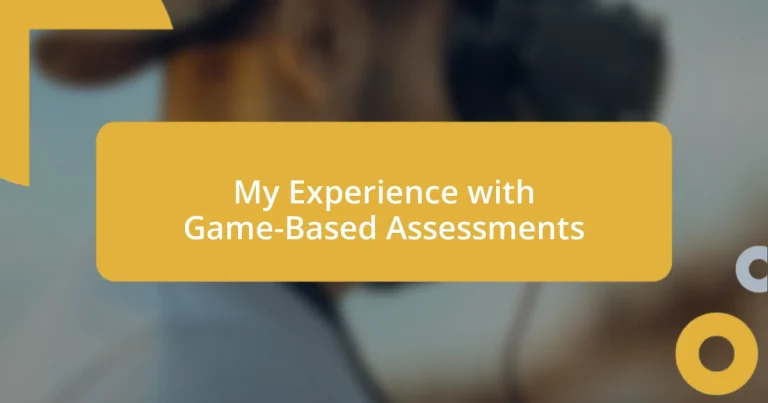Key takeaways:
- Game-based assessments increase engagement and reduce anxiety, fostering a more immersive learning environment.
- They assess a variety of skills, including critical thinking, adaptability, and emotional intelligence, offering insights beyond traditional testing methods.
- Effective participation relies on a growth mindset, strong communication, and taking breaks to enhance focus and collaboration.
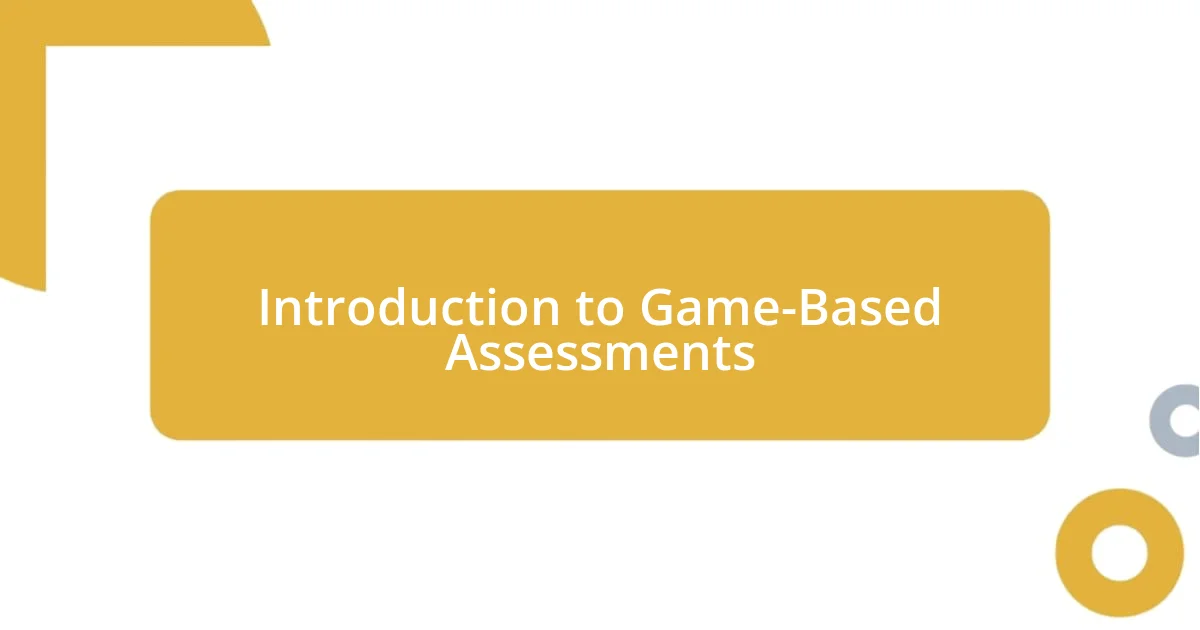
Introduction to Game-Based Assessments
Game-based assessments are transforming the way we evaluate skills and knowledge, making the process more engaging for everyone involved. I remember my first encounter with a game-based assessment; I was surprised by how immersive it felt compared to traditional tests. It took the pressure off and allowed me to showcase my abilities without the usual anxiety that accompanies sitting at a desk with a pen and paper.
Have you ever found yourself zoning out during a standard assessment? I certainly have. But with game-based assessments, I felt a rush of excitement, almost like I was playing a compelling video game. This approach not only measures performance but also taps into critical thinking and problem-solving skills in a natural and enjoyable setting. It’s fascinating how these assessments can offer a view into a person’s abilities beyond mere numbers or letters on a grading scale.
Through my experience, I’ve seen that game-based assessments often lead to more authentic interactions and insights about learners. They foster a sense of adventure, where each choice and challenge speaks volumes about one’s thinking process. I can’t help but wonder—could this be the future of assessment, where learning and evaluation intertwine seamlessly?
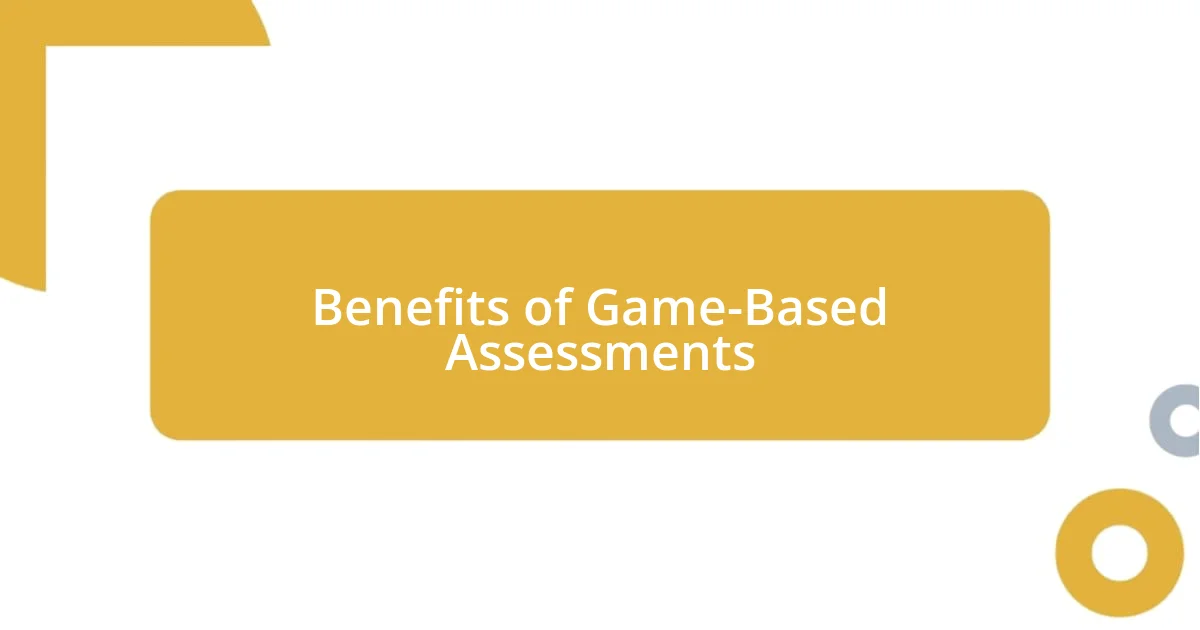
Benefits of Game-Based Assessments
When I think about the benefits of game-based assessments, one standout aspect is the heightened engagement they provide. I recall participating in an assessment that felt more like a strategic mission than a test. The excitement of advancing through levels and overcoming obstacles made me genuinely invested in the outcome. This kind of engagement not only enhances motivation but also encourages deeper learning, as the gameplay elements inspire exploration and creativity in problem-solving.
Here are some key benefits of game-based assessments:
- Engagement: Players often feel more involved and interested, reducing test anxiety.
- Immediate Feedback: Instant responses help learners adjust their strategies on the fly.
- Collaboration: Many game-based assessments allow for teamwork, enhancing social skills and collaborative problem-solving.
- Diverse Skill Evaluation: They assess various competencies, from critical thinking to adaptability, in a dynamic setting.
- Intrinsic Motivation: The game mechanics boost motivation, making assessment enjoyable rather than a chore.
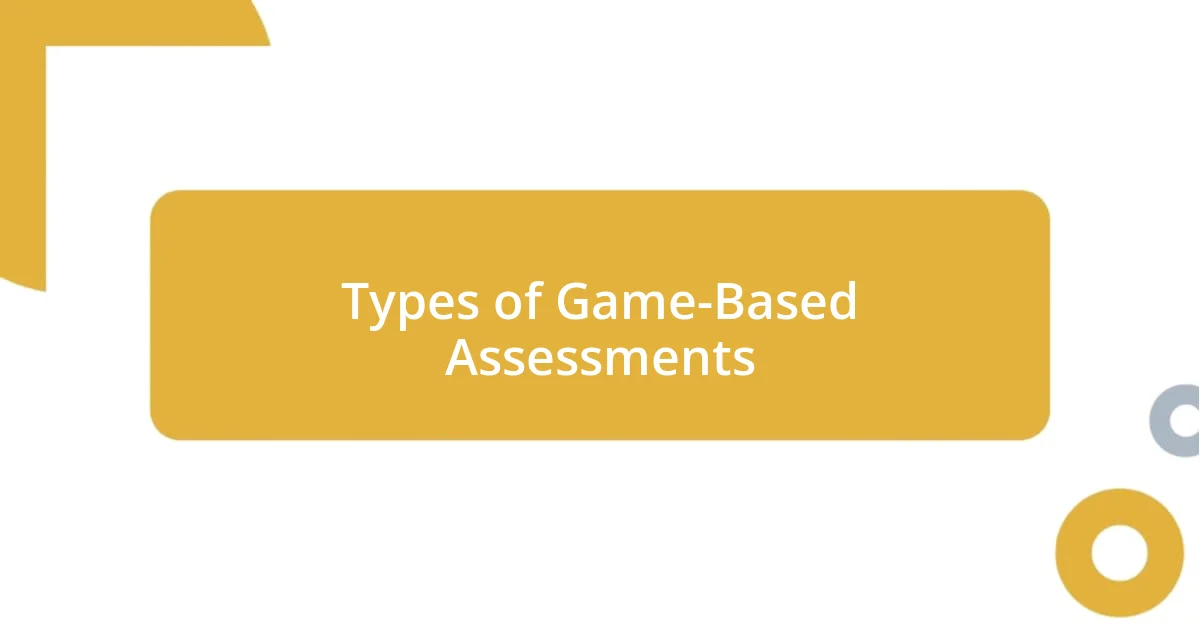
Types of Game-Based Assessments
Game-based assessments come in various formats, each tailored to measure different skill sets. For instance, simulation-based assessments place learners in realistic scenarios, allowing them to demonstrate decision-making and problem-solving effectively. I’ll never forget the thrill of navigating a business simulation, where every choice impacted my virtual company’s success. It was far more revealing than answering a series of multiple-choice questions.
Another type I’ve encountered is quiz-style games, which blend traditional assessment elements with gaming mechanics. These often incorporate timed challenges and points systems that keep learners on their toes. I remember racing against the clock in a trivia game about historical events—it was such a rush! It lightened the pressure and made retention of the material feel less like a chore and more like an exhilarating mental exercise.
Finally, collaborative games focus on teamwork and communication skills, allowing participants to tackle challenges together. I recall working with a team on a problem-solving quest where we had to strategize collectively to succeed. Not only did we bond over our shared goal, but it revealed insights into each member’s strengths and weaknesses—something a standard test could never capture.
| Type of Game-Based Assessment | Description |
|---|---|
| Simulation-Based | Immersive scenarios where learners apply skills in realistic settings. |
| Quiz-Style | Timed games that test knowledge through engaging questions and mechanics. |
| Collaborative Games | Team-driven challenges that focus on communication and teamwork. |
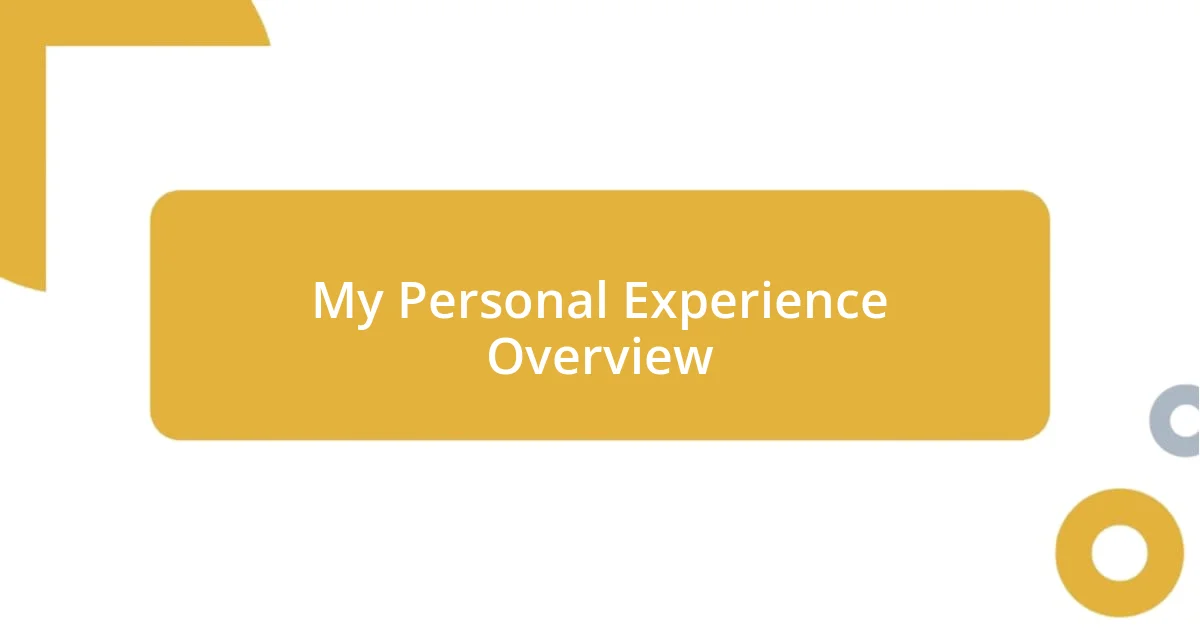
My Personal Experience Overview
My journey with game-based assessments started unexpectedly. I remember the first time I encountered one during a training session; it felt like stepping into a new world. The challenge of navigating through complex scenarios drew me in completely—did I mention how exhilarating it felt to be actively engaged rather than just filling out papers? I found myself smiling as I solved problems, completely forgetting the stress usually associated with assessments.
Reflecting on that experience, I can’t help but marvel at how these assessments transformed my learning experience. Unlike traditional tests, where I often felt pressure, the game mechanics allowed me to experiment freely with different strategies. I vividly recall one game where I made a bold choice, and though it didn’t pan out as I hoped, the instant feedback helped me refine my approach. Isn’t it fascinating how learning can feel less like a burden and more like an adventure?
One of the more memorable assessments involved teamwork during a skill challenge where every member played a vital role. We strategized, debated, and celebrated our wins together. The sense of camaraderie was powerful, and I realized how much I valued collaboration in learning environments. How often do we have the chance to not just learn but also connect deeply with others in the process? This aspect of game-based assessments profoundly impacted me, cementing a belief that learning should be a shared journey.
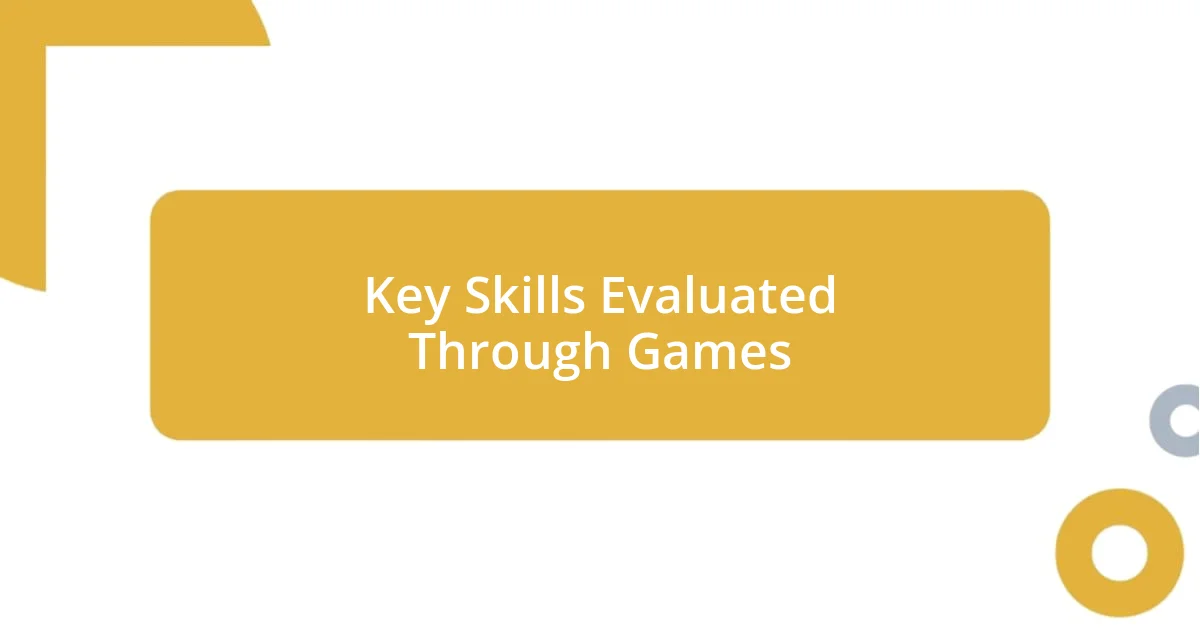
Key Skills Evaluated Through Games
One of the standout skills evaluated through game-based assessments is critical thinking. I remember tackling a puzzle game that required me to analyze clues, anticipate potential outcomes, and make careful decisions. Each level posed a new challenge, forcing me to think outside the box. It’s incredible how these games simulate complex problem-solving in a way that traditional assessments simply can’t.
Another essential skill is adaptability. During a fast-paced strategy game, I found myself constantly adjusting my plans as new information emerged. It brought to mind the unexpected twists in real-life scenarios that often demand quick decision-making. The pressure of the clock, combined with changing circumstances, created an environment that mimicked high-stakes situations. How empowering it was to develop that mental agility in such a fun way!
Lastly, I discovered the importance of emotional intelligence through collaborative games. I recall a scenario where our team faced a particularly tough obstacle, and it became evident that fostering a supportive atmosphere was crucial. As we shared feedback and encouraged one another, our synergy flourished—leading us to triumph. Isn’t it fascinating how games can not only spotlight our individual skills but also highlight how we interact with others, ultimately shaping our ability to connect and collaborate?
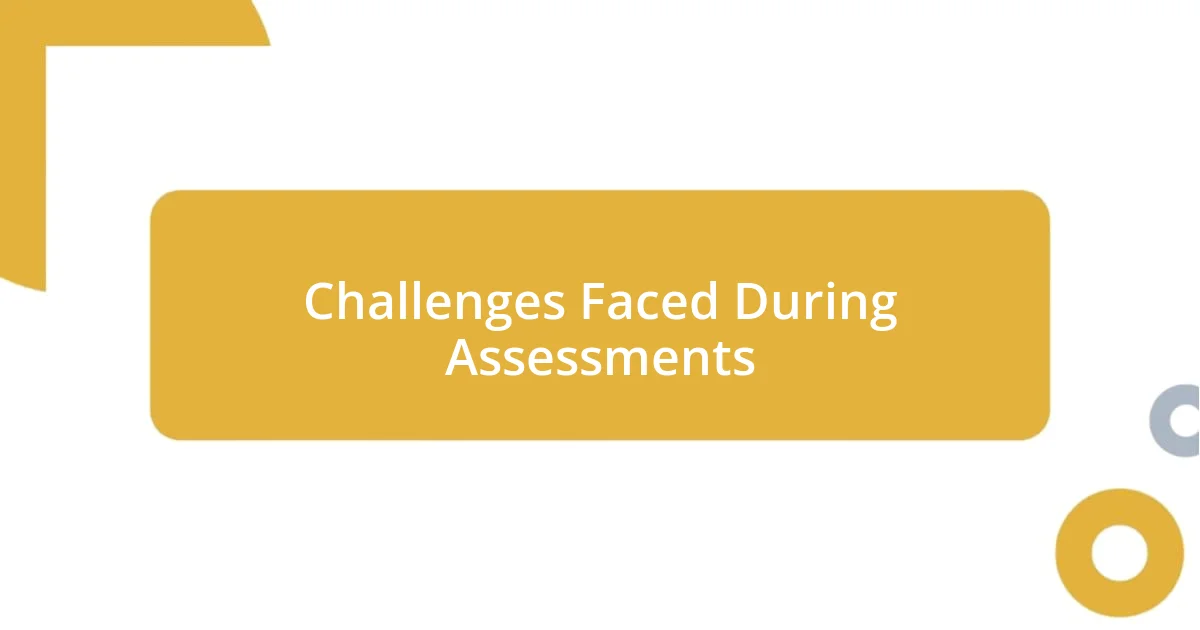
Challenges Faced During Assessments
As I navigated through various game-based assessments, there were definitely hurdles that made the experience a bit overwhelming at times. One particular instance involved a leaderboard system that ranked participants. Initially, I felt excited, but soon anxiety crept in. The pressure to perform well overshadowed my enjoyment of the game, transforming what should have been a fun challenge into a source of stress. Has anyone else felt that competitive edge turn sour?
In another scenario, I faced technical glitches that disrupted my flow. I vividly remember a moment when I was deeply engrossed in strategizing and suddenly, the game lagged. That abrupt pause felt jarring and pulled me out of the immersive experience I was enjoying. I had to remind myself to stay calm and adaptable, but it was a frustrating reminder that technology can sometimes be unpredictable. It’s interesting how much we rely on smooth tech experiences to truly engage with these assessments.
Moreover, balancing my individual performance with team dynamics posed a challenge. I recall a time when my eagerness to succeed led me to take on too many responsibilities within the group. I thought I was being helpful, but I soon realized that it overwhelmed my teammates—and me. This experience taught me the importance of sharing the load and ensuring everyone feels included. Have you ever found yourself caught in a similar situation, where the desire to help turned into pressure? It’s a valuable lesson that resonates beyond the game world, don’t you think?
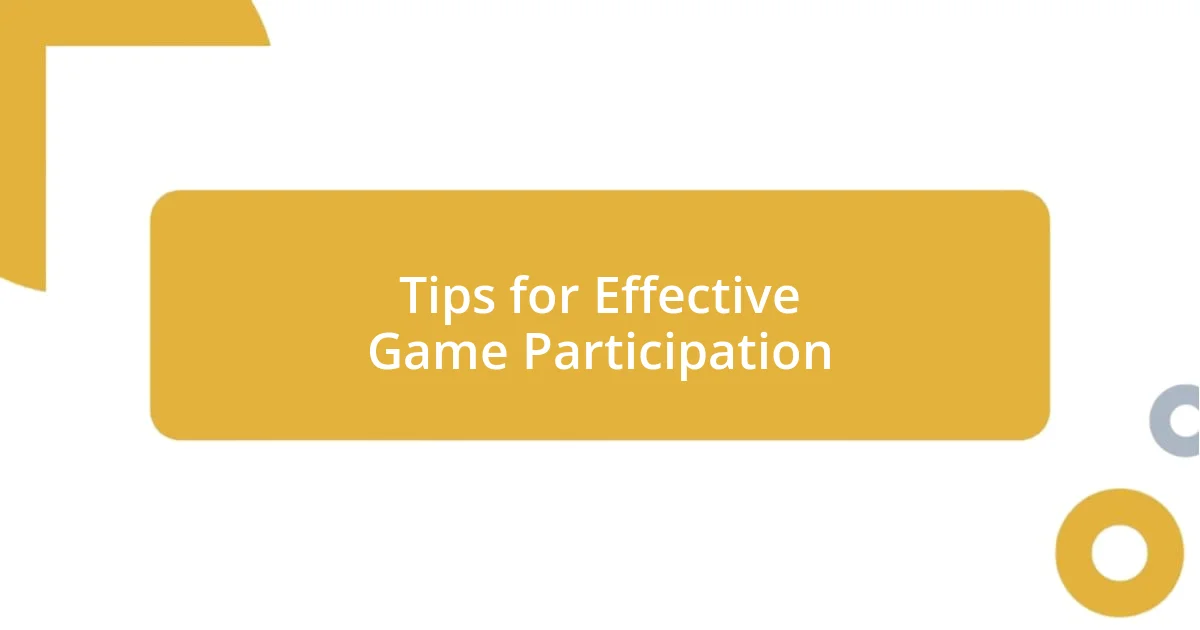
Tips for Effective Game Participation
When diving into game-based assessments, one essential tip is to embrace a growth mindset. I remember starting a difficult game and immediately feeling overwhelmed by the complexity of the challenges. Instead of succumbing to frustration, I shifted my perspective, viewing each setback as an opportunity to learn. This approach not only made the experience enjoyable but also enhanced my critical skills. Have you ever noticed how a simple mindset shift can transform your experience in any task?
Another important aspect to keep in mind is the power of communication. I once participated in a team-based game where clear dialogue made all the difference. I found myself sharing ideas, discussing strategies, and even admitting mistakes without fear of judgment. This open exchange created a supportive environment and helped us adapt quickly to challenges. It’s amazing how fostering an atmosphere of trust can elevate a group’s performance—don’t you think that’s a lesson we could apply in our everyday collaborations as well?
Lastly, don’t forget to take breaks when the game gets intense. I recall a session where I powered through several rounds without pausing, only to find myself mentally fatigued. Stepping away for even a few minutes allowed me to reset my focus and regain my energy. It’s a reminder that sometimes, the best advantage we can give ourselves in these assessments is the chance to breathe and recharge. Have you experienced the clarity that comes with a brief pause in a high-stakes moment?












